There's an old video game the memory of which recently escalated itself to my attention: Chris Crawford's Balance of Power, a geopolitics simulator first released for the Macintosh in 1985. According to Wikipedia it sold about a quarter million units, which was a lot at the time, and I must've been somewhere in the impressionable age range of 10 to 12 years old when my father bought Incredible Technologies' port for the Commodore Amiga.

Its Workbench icon featured a mushroom cloud with a hand over it in the universal that's-not-what-I-ordered gesture (though possibly gently petting it — or simply shielding the observer's eyes?), but the game itself had a minimalist, academic look, and beyond a simple dissolve effect on the title screen it featured no explosions or indeed animations of any kind. This was unusual on the Amiga, a platform known for its ability to make the rubble bounce in Technicolor.
Crawford's maze
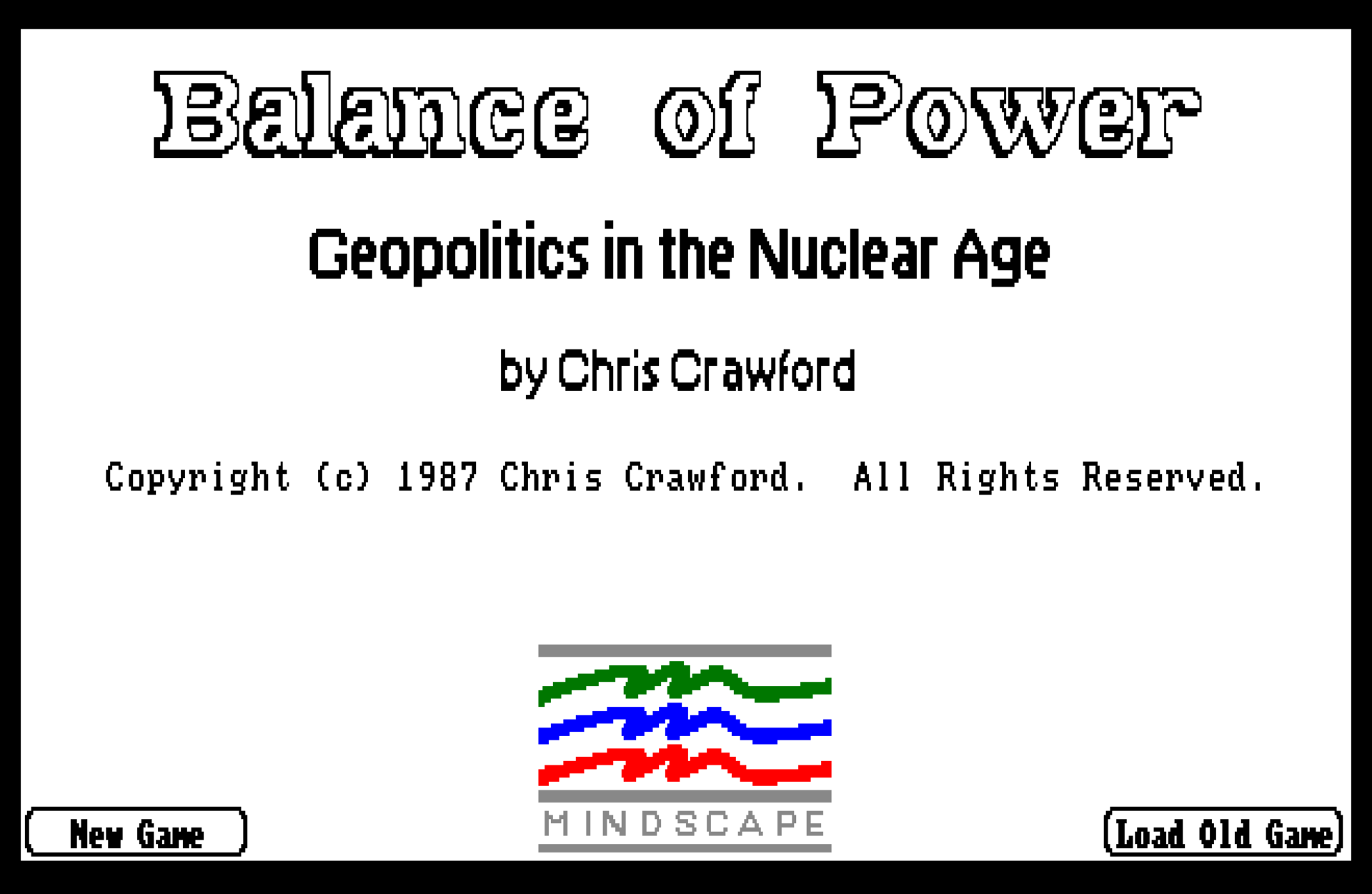
Although I had an idea of what was going on in the world — I'd observed the cultural touchstones at friends' birthday parties, caught glimpses of something less watchable but much more memorable, and seen the inside of a bomb shelter — I didn't have the toolbox for nuclear brinkmanship, let alone internalizing what I now recognize to be a beautiful 87-page manual with a hardcover sleeve and an extensive bibliography. In the end, for all the sneaking into my dad's office to play this in the dead of night, I couldn't really figure it out.
So. Since Halloween seems like a good occasion to indulge in a little psychological horror (no other reason), I decided to do a rematch of sorts — this time with the help of fs-uae.
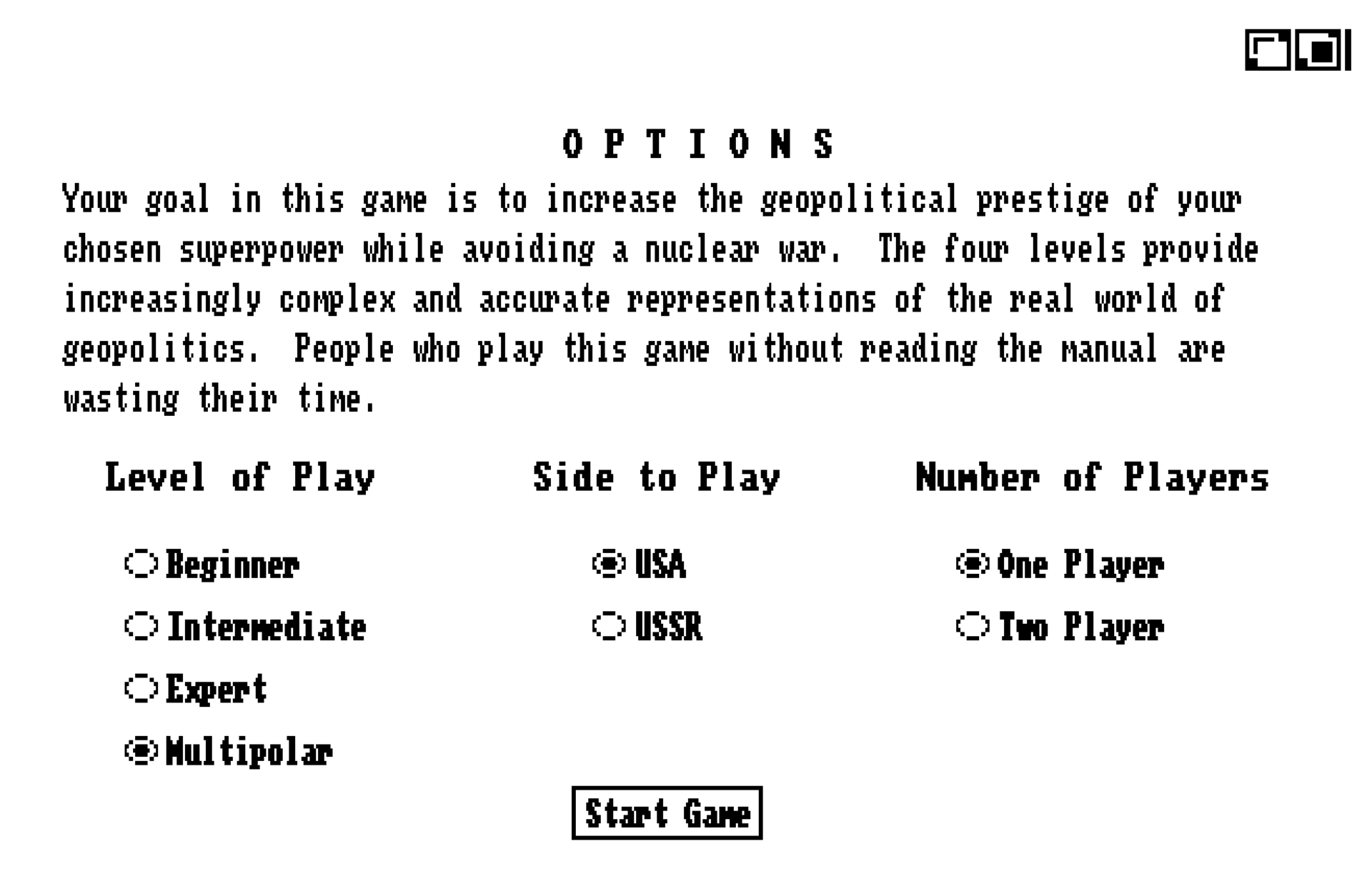
Crawford released an updated game in 1989 (simply called the 1990 edition), with the Amiga port credited to Elaine Ditton. It introduced the multipolar mode, which had been left out of the 1985 release:
Unfortunately, this multipolar view of the world is just too cerebral for most game players. It has something to do with our expectations of games; a mature, otherwise sophisticated adult will sit down with this game and ask, "How do I nuke the Commies?" Games, like stories, must have conflict, but people have been so inundated with the brutal, violent conflict standard in computer games that they are unable to grasp the subtle, indirect conflict arising from a multipolar world. This was a very painful discovery, and it forced a shift in the game from a multipolar view toward a more bipolar view. Minor countries had been able to pursue their own foreign policies; now they are passive pawns. Neutralist policies were entirely feasible; now minor countries choose up sides along left-wing/right-wing lines. The result is less realistic but more suited to the needs of the game-playing audience. Perhaps someday a more sophisticated game will be possible.
BOP manual, p. 74
Ok, so it's 2022 now, and we're all sophisticated down here. We want the multipolar. Furthermore, although the game didn't anticipate certain pivotal events of 1991, we'll play as the USA just to be on the safe side.
Here in the future, we also come armed with source code courtesy of the man himself: In this case, it's written in Pascal with a tiny morsel of assembler, of which the latter mostly exists to calculate square roots. BOP doesn't really have any spoilers apart from the obvious one, and a peek here and there should be interesting.
For the RAND analyst in you
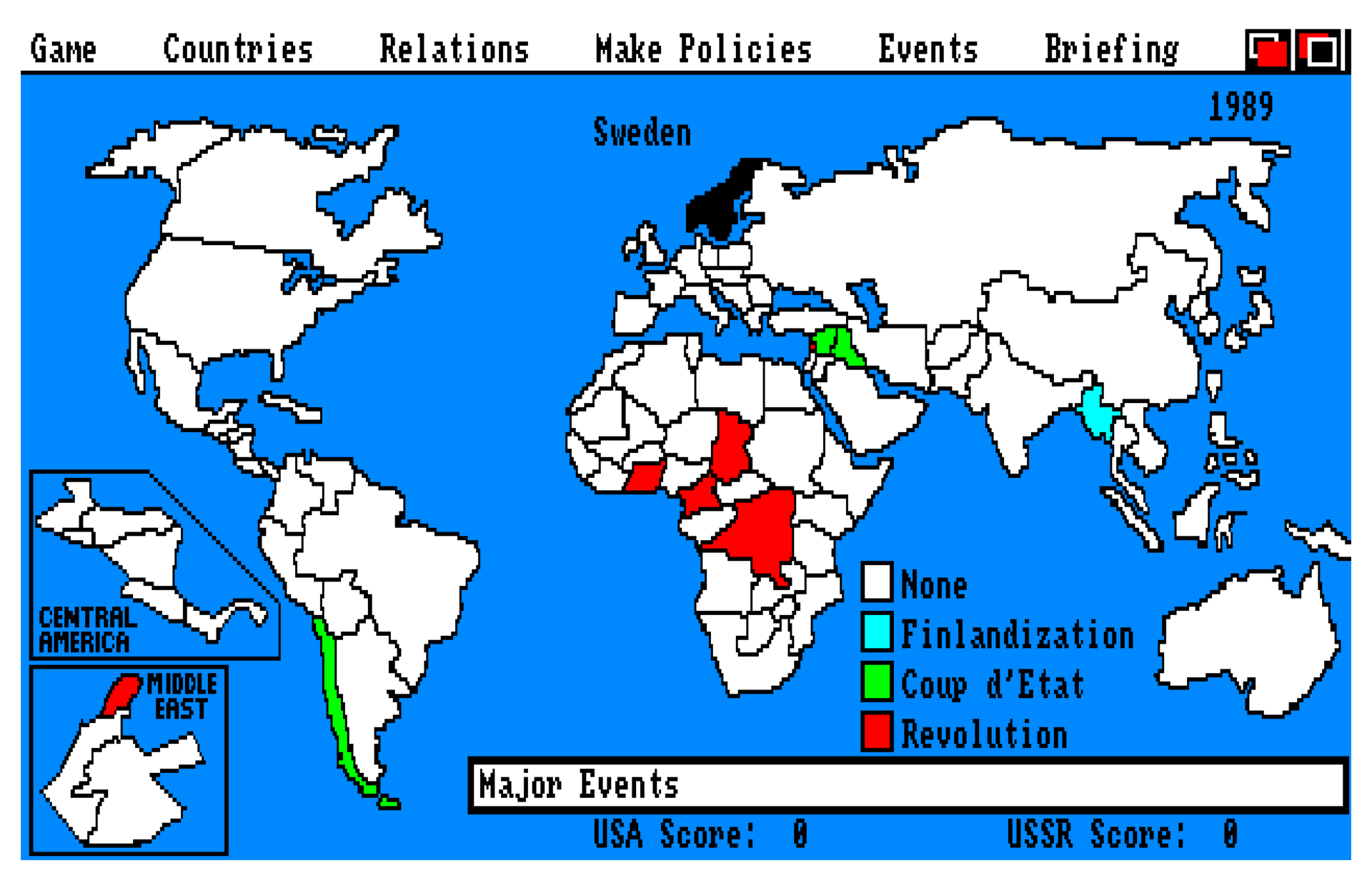
The centerpiece of the game is, logically enough, the world map. It reflects some of the assumptions and technical limitations of the time: Many countries were removed because they'd make too small click targets or were thought to be strategically redundant. For instance, my own little corner of the world has been unceremoniously rolled into Sweden, which is fine (I, for one, welcome the Kalmar Union redux).
Next up, "Finlandization" is represented in the game, but Finland is not. This seems unfair to the Finnish. Of course, there's the unfairness of the entire, uh — (gesturing vaguely at the map) — to consider. It's very much not a game about curing the world's ills. But we'll live. Probably.
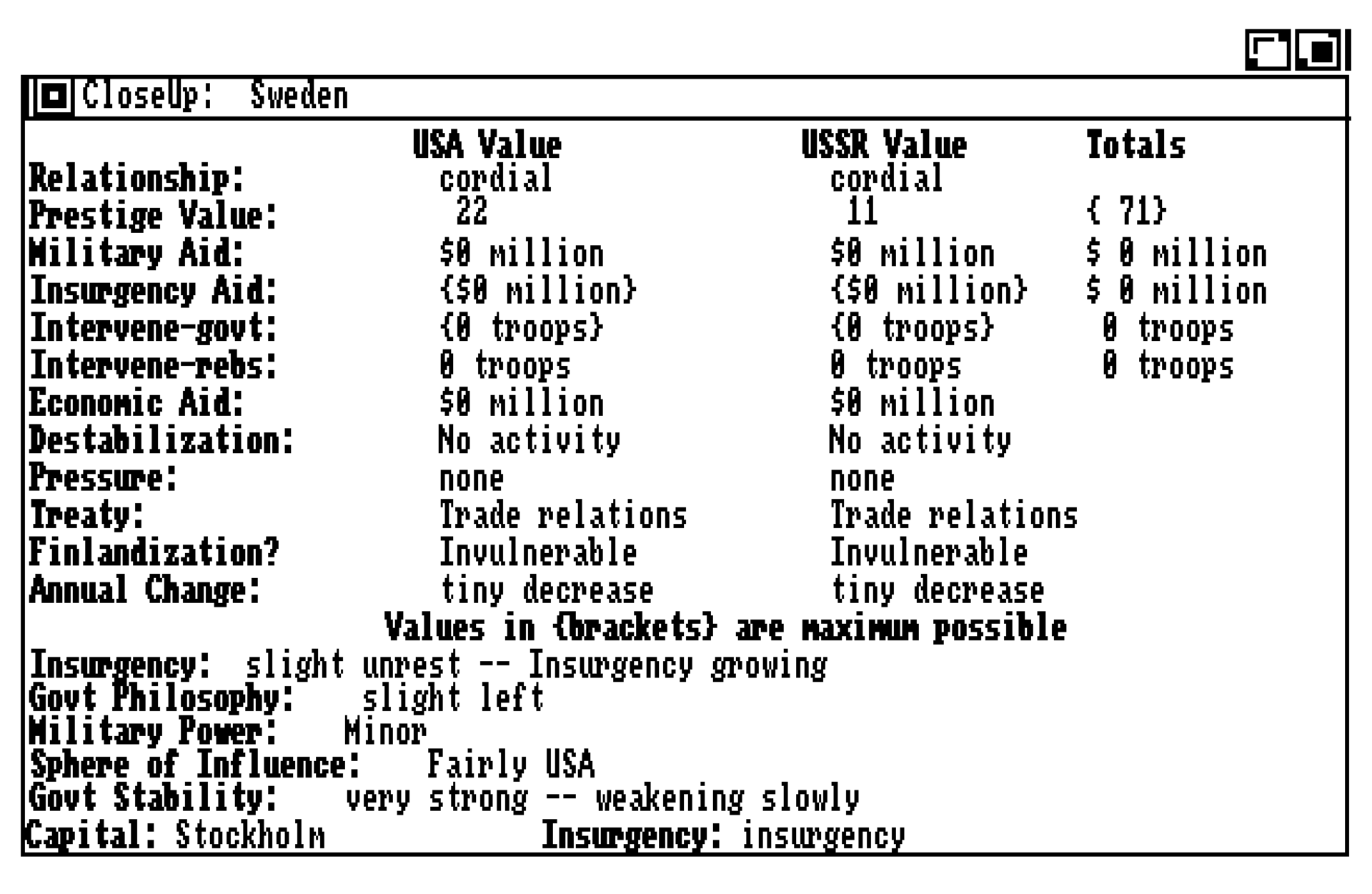
Each country has a large number of variables attached. Some are directly manipulable, contingent on the limitations of physics and diplomacy. For instance, you could send military aid to the Swedish government but not the rebels, since there aren't any in Sweden to speak of. However, you could still intervene on behalf of these "rebels" and bootstrap an insurgency on some flimsy pretext. There are also subtle ways to change the existing government's mind and eventually sign a treaty that would let you station troops with them.
The important variables, such as government stability, security, affiliation and power, are only indirectly manipulable. Some of them are hidden, and most of them are obfuscated by natural language. There's no way you can break out your calculator to predict exactly what'll happen on the next turn, no big "Democracy" button to slam for a +2 bonus to semiconductors or whatever. You're forced to read reports and think in terms of… well, not exactly the real world, but at least a facet of it.
The game plays out over eight turns representing the passage of calendar years. On each turn, countries make their policy moves and optionally dispute each other's moves, and then the simulation ticks. The last part is where the magic happens. As an example, here's how country i's desire to Finlandize to superpower j is calculated:
y:=MilPowr[i]-InsgPowr[i];
FOR j:=1 TO 2 DO
BEGIN
x:=InsgIMax(j,i);
ProjPowr[j]:=(IntvConv(x)*ord4(MilPowr[j])) div MilMen[j];
x:=Treaty[3-j,i];
x:=(Should(x)*ord4(MilPowr[3-j])) div 128;
SelfPowr[j]:=y+(x*ord4(Integrty[3-j])) div 128;
IF SelfPowr[j]<1 THEN SelfPowr[j]:=1;
temp:=((ord4(Adventur[j]-DipAff^^[j,i])*ProjPowr[j]*(Pressure[j,i]+4))
div SelfPowr[j]);
IF temp<0 THEN temp:=0;
IF temp>2048 THEN temp:=2048;
FinlProb[j,i]:=temp div 8;
END;This is an interesting function with a couple of variables in play:
- The government's military strength relative to insurgents' (
MilPowr[i]-InsgPowr[i]). - The threatening superpower's military spending (
MilPowr[j]/MilMen[j]) and ability to intervene in the area.InsgIMax(j,i)considers troops stationed in countries geographically adjacent toi. - The supporting superpower's military strength, treaty level and history of honoring its commitments (
Integrty[3-j]). - The level of any diplomatic pressure campaign — harsh words, basically — aimed at the country (
Pressure[j,i]). There's a small constant added to it, so the multiplier can never be zero; posting lots of soldiers next door can be quite menacing even if it's done quietly. - The adventurism factor (
Adventur[j]), proportional to the demonstrated combativeness (Pugnacty[j]) of the threatening superpower relative to that of the other's plus the overall political tension in the world (Nastiness). This goes up if the situation seems dangerous and uncertain. - The diplomatic relationship between the threatening superpower and country
i. This is a signed integer with0being neutral. Effectively, being on good terms neutralizes the threat posed by soldiers, but not that of general craziness.
Another delightful wrinkle is what happens if the superpowers put boots on the ground on opposing sides of a conflict, meaning the US and USSR are in a shooting war:
IF ((IntvGovt^^[1,i]>0) AND (IntvRebl^^[2,i]>0)) OR
((IntvGovt^^[2,i]>0) AND (IntvRebl^^[1,i]>0)) THEN
BEGIN {USA fights with USSR}
DipAff^^[1,2]:=-127;
DipAff^^[2,1]:=-127;
Nastiness:=127;
Pugnacty[1]:=127;
Pugnacty[2]:=127;
END;BOP treats this as an extremely serious situation and cranks up the Nastiness and Pugnacty factors, causing worldwide ripple effects (conflicts may erupt or worsen, weak governments may collapse, etc).
There's a lot more to it, but you get the idea: It's an interconnected world with gradual change, tipping points and cascading effects. I think few games pull this off — or dare attempt it — because it can leave a very narrow road between the extremes of boring (too stable) and incomprehensible (too chaotic). Throw in expectations of realism, and it's a tall order.
BOP manages fine, in part due to carefully chosen initial conditions and constraints on what it deems "minor" (non-superpower) countries. Here's Canada:
InitCountry(14,'Canada',2040,228,441,-10,-125,10000,0,36,20,9,56,255,77,99,12);
InitCont(14,1);
MinorSph^^[14,17]:=TRUE;
MinorSph^^[14,18]:=TRUE;
MinorSph^^[14,20]:=TRUE;
FiniCntry(14);Defined as being contiguous with the USA (country #1), it adds Britain, France and West Germany to its sphere of influence, so when the AI hammers out its foreign policy, it will only consider these four counterparts. Britain for its part has 15, and France is up there with 12, but Sweden has only the one on its eastern border.
Frank exchange of opinions
FUNCTION Crisis;
{Returns a value of TRUE if the missiles fly}Of course, countries don't get to undermine and invade each other willy-nilly. There are checks on this activity, such as the local neighborhood superpower getting on the phone and politely telling them to knock it off. When this happens to a minor country, it will pull back and just quietly stew for a bit, souring diplomatic relations, but with superpowers on both ends, things get exciting: It turns into a game of chicken. The superpowers take turns escalating, starting with a zero-stakes back-channel discussion, through diplomatic and military crises, until either one of them backs down or a nuclear war starts. The prestige penalty for backing down increases as the crisis escalates.
This can be frustrating, since it's easy to misjudge the computer's commitment (though it drops hints in its diplomatic missives, e.g. when it "categorically refuses" you may be about to have a bad day). The 1990 edition added advisors, in theory making it easier to get a read on the situation.
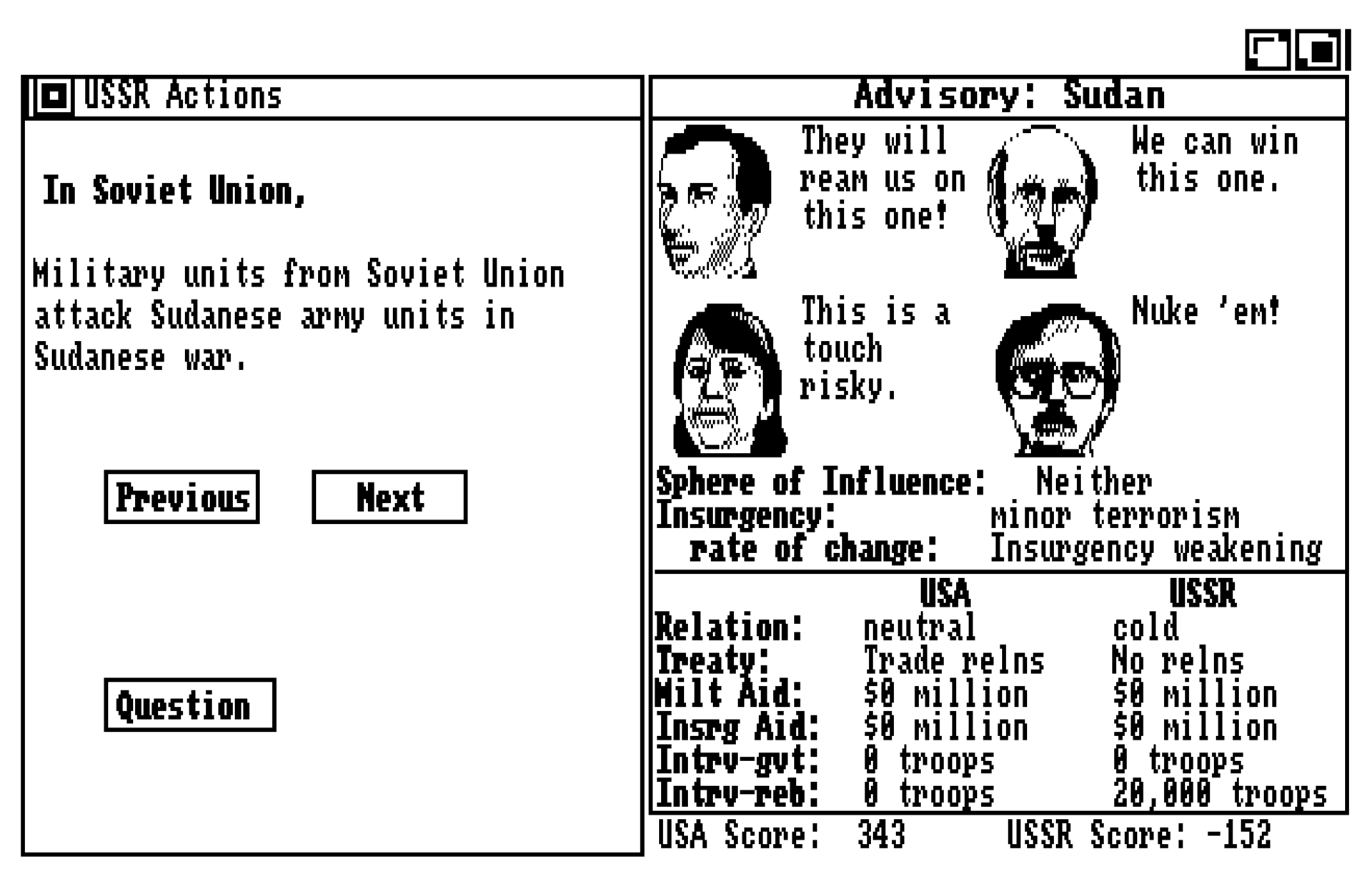
You can usually sort of interpolate their various opinions, but it's harder when they disagree wildly on an issue — like the above, where the Soviets just dispatched 20,000 soldiers to topple the government of Sudan. It sounds like a mean thing to do, and — more importantly — it would strengthen Soviet influence in the region and weaken ours. I don't think they're serious about this, so let's put our chips on advisor number four, the one with the mustache. I like his attitude.

Mr. Gorbachev turns a deaf ear, so we go public with a diplomatic challenge. Still no. The world is watching now, and since there's an uncomfortable amount of prestige at risk, we press the issue and threaten a military response.

They escalate to DEFCON 4, we go to DEFCON 3, and they respond by escalating again. That's DEFCON 2, with bombers in the air and humanity collectively holding its breath. We're left with two choices: either let rip (and end the game) or back down and suffer crushing humiliation. This is bad. The prestige hit will affect our diplomatic relations, hamstringing us and effectively cutting our lead in half. Good thing we can absorb the loss without falling hopelessly behind. Otherwise, well…
Anyway. How could advisor #4 lead us astray? The answer lies in this excerpt from the GImpt() function:
x:=DipAff^^[i,Obj] div 4;
y:=(Should(Treaty[i,Obj]) div 4)+1;
z:=(ord4(DontMess[Obj])*1280) div SumDMess;
t:=Adventur[i] div 2;
CASE Bias OF
0: BEGIN END;
1: BEGIN x:=x*MySqrt(Abs(x)); y:=MySqrt(y); END;
2: BEGIN y:=y*MySqrt(y); z:=MySqrt(z); END;
3: BEGIN z:=z*MySqrt(z); t:=MySqrt(t); END;
4: BEGIN t:=t*MySqrt(t);
IF x>0 THEN x:=MySqrt(x) ELSE x:=-MySqrt(Abs(x));
END;
END;The enum values 1-4 correspond to the different advisors. Looking at the fourth one, our guy is giving more consideration to Adventur[i] — the adventurism factor again, which frankly must've been pretty high at this point in the game — and less to our relations with Sudan. Our belligerence emboldened him, and we got some bad advice in return.
Again there's a lot more going on under the hood, and a lesson for budding diplomats:
This system produces some behaviors that may surprise you. For example, suppose that you as an American player gave economic aid to Nigeria. The Soviets take objection to this and start a crisis. You escalate, they escalate, and a nuclear war starts. The question on your lips is, why would those idiots annihilate the world over economic aid to Nigeria? The answer is, because you were willing to annihilate the world over Nigeria. Remember, it takes two to make a crisis. The computer figured that this just wasn't an important issue for you, and that, while trivial, it was still a more important issue for itself. It therefore stuck to its guns. […]
This raises a very important point about geopolitics. You could protest loudly, "But I do care about Nigeria! The computer can't assume what I'm really thinking!" You are absolutely right. Real-world diplomats don't know what's really going on in the minds of their interlocutors. They know perfectly well that today's words are only an expression of today's exigencies. The only thing they can rely on are the substantial events of the past. If you have built up a record of close relations with Nigeria, your behavior in a crisis will have to be taken seriously. If your record is of weak relations, then your behavior will not be taken seriously. The computer treats it that way. If you want to convince people that you're serious, you've got to lay the groundwork.
BOP manual, p. 77-78
Enough of that. Are ya winning, son?
Yeah, about that rematch. This isn't tic-tac-toe, so you can play it and win. Sort of.
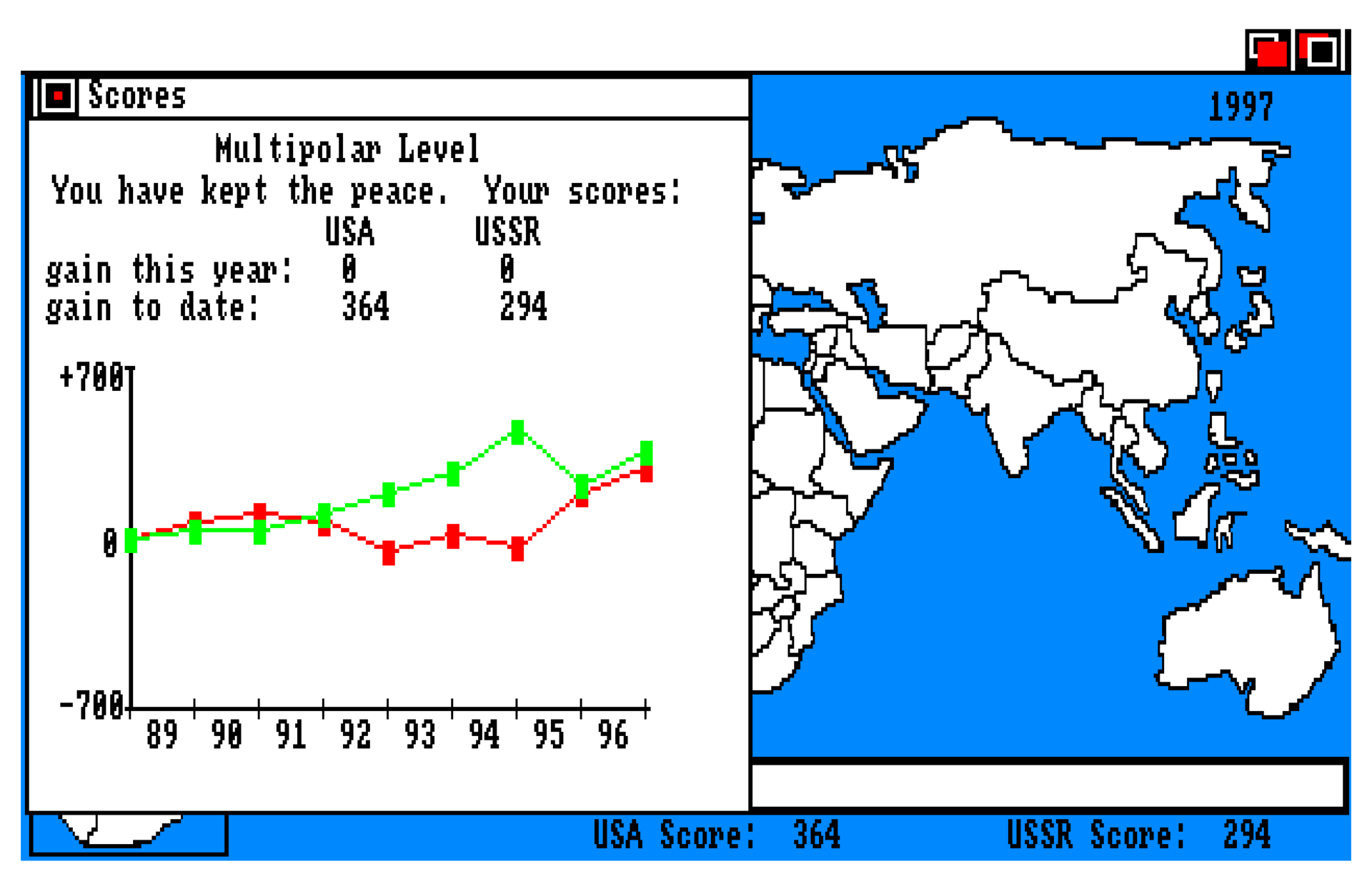
The main difficulty lies in us and humanity getting to this screen — although "kept the peace" tends to belie some dismal stuff unleashed along the way — after which we can relax and judge the result for ourselves.
As you can see, mistakes were made in 1995. Lest you judge me, the (now former) government of Mexico forced my hand! What followed made a lot of people unhappy, and then the French admin collapsed amidst the general chaos.
I did keep the green line up, though, so we'll call it the good ending. It took a few tries.
Unforeseen consequences
resource 'STR ' (705, purgeable) {
"2* response* reply* answer* reaction*"
};
resource 'STR ' (706, purgeable) {
"2* is coming* is being sent* is on its way* will arrive*"
};
resource 'STR ' (707, purgeable) {
"2* via the North Pole.* over your northern border.* by ICBM.* by m"
"issile courier.*"
};It's not an easy game. You could know the rules like the back of your hand, and it still wouldn't eliminate the risks.
The crisis dialogue has one final surprise in store for us. As you click through the DEFCONs, there's a random factor that becomes increasingly relevant. It represents the likelihood of an oopsie:
x:=0;
CASE CrisisLevel OF
2: x:=16;
3: x:=8;
4: x:=2;
END;
IF DipAff^^[1,2]>0 THEN x:=0 ELSE x:=(x*(-DipAff^^[1,2])) div 64;
y:=Random div 128;
IF x>(Abs(y)) THEN BEGIN CrisisLevel:=1; ANWFlag:=TRUE; END;Watch out for that ANWFlag! The risk is at its highest when going to DEFCON 2 with superpower relations bottomed out (as they'd be in a shooting war): (16 * 127 / 64) / 128 = 0.248, or roughly a 25% chance of unintended fireworks.
In most cases, the probability will be much lower. If your relations are merely kind of bad at -32, and you go to DEFCON 4, the risk is 1/128, or 0.8%. In the real world that's not so low, but for the purposes of BOP it's a low probability/high impact risk you'll be taking again and again.
Good thing, then, that we only have to make it through eight years. The risks add up over time, and even if you play quite carefully, you will come to fear a certain arresting memo:
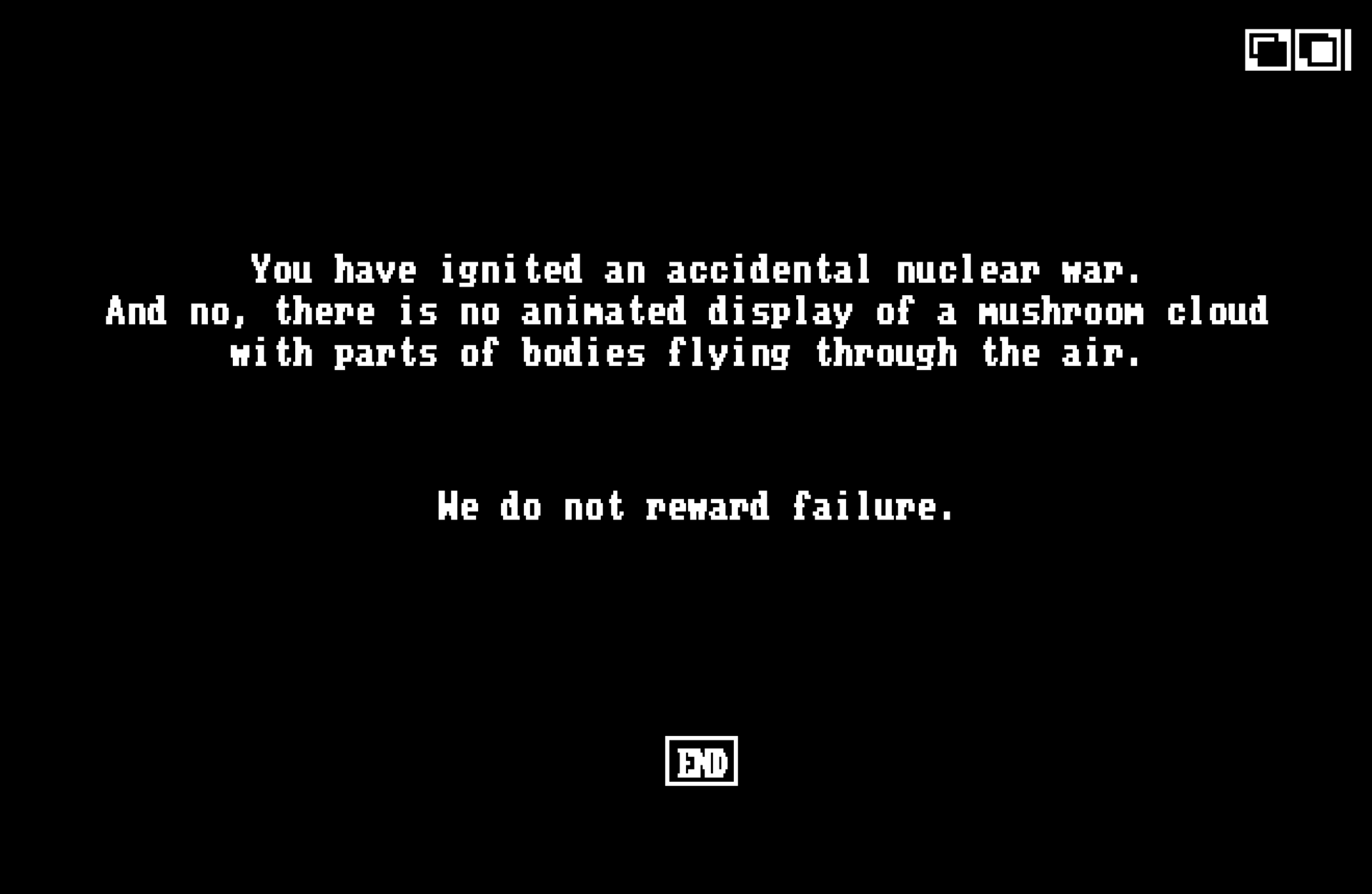
The "END" button drops you back to the desktop. In order to succeed at this game you need patience, a cool head and plenty of luck.
Great writeup, I'd be curious to try and play it. Are you aware of any browser version or similar to try my hand?
You've got a couple of options. The best is probably to install WinUAE or fs-uae and get the ADF file from archive.org, for instance from the sidebar on this page:
https://archive.org/details/Balance_of_Power_The_1990_Edition_1989_Mindscape_cr_QTX
You could also play it in the browser there, but the in-browser Amiga emulator is heinously slow.
The next best option I could find is the Macintosh version, which runs ok in the browser, but doesn't look as good (and some of the strings appear to have been vandalized):
https://archive.org/details/BalanceOfPower2Macintosh
It has manual-based copy protection, so you'd have to find a copy of the manual somewhere too (look in the reviews at that link, maybe).
Too bad for anyone wanting to rule the world from Tasmania, they forgot to put it on the map.
Merci for the tips..